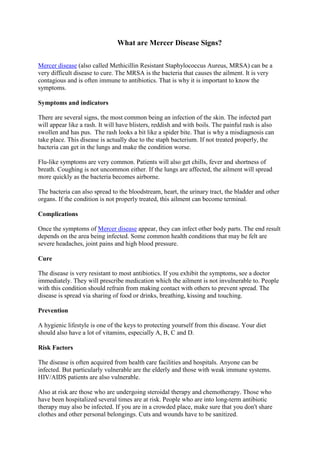
Signs And Symptoms of Mercer's Disease
- 1. What are Mercer Disease Signs? Mercer disease (also called Methicillin Resistant Staphylococcus Aureus, MRSA) can be a very difficult disease to cure. The MRSA is the bacteria that causes the ailment. It is very contagious and is often immune to antibiotics. That is why it is important to know the symptoms. Symptoms and indicators There are several signs, the most common being an infection of the skin. The infected part will appear like a rash. It will have blisters, reddish and with boils. The painful rash is also swollen and has pus. The rash looks a bit like a spider bite. That is why a misdiagnosis can take place. This disease is actually due to the staph bacterium. If not treated properly, the bacteria can get in the lungs and make the condition worse. Flu-like symptoms are very common. Patients will also get chills, fever and shortness of breath. Coughing is not uncommon either. If the lungs are affected, the ailment will spread more quickly as the bacteria becomes airborne. The bacteria can also spread to the bloodstream, heart, the urinary tract, the bladder and other organs. If the condition is not properly treated, this ailment can become terminal. Complications Once the symptoms of Mercer disease appear, they can infect other body parts. The end result depends on the area being infected. Some common health conditions that may be felt are severe headaches, joint pains and high blood pressure. Cure The disease is very resistant to most antibiotics. If you exhibit the symptoms, see a doctor immediately. They will prescribe medication which the ailment is not invulnerable to. People with this condition should refrain from making contact with others to prevent spread. The disease is spread via sharing of food or drinks, breathing, kissing and touching. Prevention A hygienic lifestyle is one of the keys to protecting yourself from this disease. Your diet should also have a lot of vitamins, especially A, B, C and D. Risk Factors The disease is often acquired from health care facilities and hospitals. Anyone can be infected. But particularly vulnerable are the elderly and those with weak immune systems. HIV/AIDS patients are also vulnerable. Also at risk are those who are undergoing steroidal therapy and chemotherapy. Those who have been hospitalized several times are at risk. People who are into long-term antibiotic therapy may also be infected. If you are in a crowded place, make sure that you don't share clothes and other personal belongings. Cuts and wounds have to be sanitized.